archive press 2011
The Prosecutor takes the battle to demolish illegal houses to the Supreme Court
For the first time, a motion has been filed for a ruling on the application of this penalty faced with differences of opinion amongst the judge
LaVozDigital.es, 7th December, Silvia Tubio, Cadiz
The Supreme Court can make a definitive ruling on this issue.
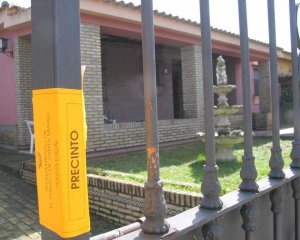 The Cadiz Prosecutor has not given up on its fight against illegal urbanism. The previous Environmental prosecutor, Angel Nunez, and now his successor, Patricia Navarro, have spent years advocating that homeowners convicted of constructing an illegal house, should demolish the house in addition to receiving a prison sentence. The Prosecutor knows that these cases usually result in minimum prison sentences that are never enforced and economic sanctions that do not persuade other promoters from continuing to build houses outside the law. The key penalty is demolition but differences of opinion amongst judges are producing contradictions resulting in homeowners with demolition orders and others who save there homes in spite of being found equally guilty.
The Cadiz Prosecutor has not given up on its fight against illegal urbanism. The previous Environmental prosecutor, Angel Nunez, and now his successor, Patricia Navarro, have spent years advocating that homeowners convicted of constructing an illegal house, should demolish the house in addition to receiving a prison sentence. The Prosecutor knows that these cases usually result in minimum prison sentences that are never enforced and economic sanctions that do not persuade other promoters from continuing to build houses outside the law. The key penalty is demolition but differences of opinion amongst judges are producing contradictions resulting in homeowners with demolition orders and others who save there homes in spite of being found equally guilty.
Against this background, The Cadiz Prosecutor is asking the Supreme Court to rule on the execution of this penalty as part of the sentence, establishing a type of case law which obliges judges in the courts of first instance and magistrates in the Audencia to follow the rule of the Supreme Court. This method is intended to eliminate the disparity of critera that generally result in the avoidance of demolition orders.
If accepted, the pioneering appeal presented by the Cadiz Prosecutor will be the first time that the Penal Court will pronounce on this issue, because thus far the only rulings have come from the Litigation Division (that which resolves disputes between citizens and the administration). Judicial sources explained to this newspaper that the position of this court is similar to that of the Cadiz prosecutor. Something that the Prosecution aims to exploit.
The mechanism used to reach the Supreme Court has been to build on one of the few cases against illegal construction that has been dealt with in the Audencia. This was possible because this case dealt with other things such as fraud in addition to the planning crime.
Tried and then sentenced to 18 months in prison was the promoter of a family home which was constructed on a non urbanizable parcel of land situated on Sanlucar Road in the town of El Puerto, next to an inn called El Parajo. The woman sold the property to a third party without telling them that they were buying an illegal house that also had an administrative file opened by the Town Hall ordering the stoppage of the construction and the demolition of what had been built. However, as stated in the judgement, she violated this municipal order and continued with the work, ignoring the seal which had been place on the plot. This took place in 2005, in the midst of the building boom.
In spite of a conviction, the magistrates from Section Four of the Audencia ruled that the house should not be demolished as requested by the Prosecutor. citing an argument repeated in other sentences: the principle of proportionality. The magistrates believed that the area where the house was built also contained other houses which had been built outside the law, and for that reason to condemn the house to a process of demolition would be ‘disproportionate’.
The Prosecutor believes that this reasoning does not help to stop this phenomenon, but on the contrary, promoters see that the house is not at risk even if they are convicted. For this reason, they have taken this judgement as a test case to the Supreme Court. If the Proposal of the Prosecutor is accepted this could be a landmark ruling in the fight against illegal construction.
Property Purchase Pitfalls exposed
By Dave Jones,Costa Almeria News , 8th December 2011
 "We have done our best but it still falls short of expectations and the problems continue, with some families facing the loss of their homes and investments made in good faith".
"We have done our best but it still falls short of expectations and the problems continue, with some families facing the loss of their homes and investments made in good faith".
This is one of the conclusions reached in the hard-hitting booklet launched by UK based MEP Diana Wallis entitled "European property rights and wrongs". The 71 page publication covers problems that buyers have experienced, in particular in Spain - examining pitfalls such as corruption or failed administration at local level; off plan purchases; 'land grab' laws and bank guarantees.
The Liberal Democrat MEP for Yorkshire and the Humber reveals that it is a reaction to a flood of complaints from her own constituents and many other victims around Europe. She hopes the publication "will hep raise the profile of these matters". "Many sadly have found themselves entangled in impossible legal nightmares;lost deposits, buildings not built, or built in breach of local planning legislation;every possible permutation has crossed my desk at some point or another" she stated.
"Each one represents the life of an individual, or the life of a family ruined, perhaps the biggest investment of thier life lost". "One could all too easily draw the conclusion that we have created a European Union of freedom of movement but without proper safeguards and access to justice," she lamented.
The booklet also examines European Law and how it can better assist the victims. However, Mrs Wallis states: "What is lacking is clear and systematic intervention from the European legislature", in part because most property and planning issues stem from national law and "therefore the remedy has to be sought in national courts and ultimately at the Strasbourg Court of Human Rights rather than in Brussels or Luxembourg".
She continues "All this is rightly infuriating to the citizens or group of citizens threathened with losing ther home; when, if they had thought Europe was about anything they thought is was about guaranteeing certain fundamental rights".
European Property Rights and Wrongs
Latest Changes to the Andalucian Planning Laws are another nail in the coffin
If you buy an illegal house in good faith, it’s your fault and you will be punished according to the latest amendments to the LOUA.
AUAN, 21st November 2011
 The regional government of Andalucía has announced that it is changing its planning laws (LOUA) in an attempt to revitalise the struggling real estate sector by easing the requirements for building in urban areas. However, according to sources in Abusos Urbanisticos Almanzora NO (AUAN), an association of homeowners who purchased homes in Andalucía only to find that these homes had fallen foul of the regions poorly managed planning regulations, the latest changes do little to encourage potential buyers to reach for their chequebooks.
The regional government of Andalucía has announced that it is changing its planning laws (LOUA) in an attempt to revitalise the struggling real estate sector by easing the requirements for building in urban areas. However, according to sources in Abusos Urbanisticos Almanzora NO (AUAN), an association of homeowners who purchased homes in Andalucía only to find that these homes had fallen foul of the regions poorly managed planning regulations, the latest changes do little to encourage potential buyers to reach for their chequebooks.
“Section thirty five of the text is a classic example of how the Ministry for Housing and Planning views home buyers as a potential threat to judicial order” said Maura Hillen, AUAN president. It reads, rather ponderously, “The measures to protect planning legality and the reestablishment of the perturbed judicial order have a real character and apply to third party purchasers of property subject to such measures because of their status as subrogated in law by the responsibilities of the person causing the planning illegality”.
“In layman’s terms this means that if you buy an illegal house in good faith, you inherit the problem” says Mrs. Hillen. “For example, if the Property Register is inaccurate and fails to reveal the existence of a planning problem a purchaser in good faith may buy this property and may subsequently face unforeseen legalisation costs or in the worst case, demolition without prior compensation. Given that the property register currently gives a clean bill of health to Helen and Len Priors house (it was demolished in 2008), you can understand the risks that you face” she continued.
“I suppose that it is too much to expect that a Ministry whose leader, Josefina Cruz Villalon, described foreign purchasers as ‘an invasion of people,…who are not from this country, who settled here illegally’ etc, etc, would even attempt to solve the problems suffered by thousands of European citizens, the majority retired, who have invested practically all of their savings in Andalucía, invited by promises of a warm welcome, a sunny climate and a legally safe place to live. We believe that perhaps it cannot be expected that such people will create an environment which encourages further European investment in real estate here. Many Britons, having learned their lesson have now left Andalucía; some others are abandoning their homes. ? How can one hope that more Britons will invest in Andalucía when their compatriots have been treated in this way?” she concluded.
According to the new bill, homeowners also face penalties if they own a house that is deemed to be illegal with additional requirements in terms of urbanisation costs and the possibility of fines.
The bill also encourages the role of the Urbanising Agent, a figure that plans and executes the urbanisation works presenting the landowners with the bill. “This role requires careful regulation to safeguard the rights of the landowners and to prevent abuses, something which this bill does not do.” said Mrs Hillen.
“This regulatory change is of interest to everybody. We understand that it is being passed via an emergency procedure in the Andalucía Parliament. We do not understand such urgency without sufficient debate. Needless to say, those affected, represented by AUAN and similar associations have not been consulted and it all seems a bit rushed”.
“In the meetings we have had with the Junta de Andalucía we have advocated for sensible and practical solutions like those that have been applied in other autonomous regions of Spain. These latest changes are neither sensible nor practical. Sadly, for everyone this regional government never listens and this bill is just another nail in the coffin.” concluded AUANs president.
AUAN, el colectivo inglés que lucha contra los abusos urbanísticos en la Valle de Almanzora, ha aconsejado a los británicos "no ser llevados a engaño " por la última medida presentado por la administración central supuestamente para restaurar confianza en el sector inmobiliario español. AUAN, the English group that campaigns against urban abuse in the Valley of Almanzora, councils the British to "not be fooled" by the latest measures presented by the central government to restore confidence in the Spanish Property Sector.
AUAN Nota de Prensa, 18 Octubre 2011
En julio el Colegio del Registradores ha presentado una nueva página web en inglés (https://buyingahouse.registradores.org/) con el supuesto objetivo de simplificar el proceso de comprar una vivienda por compradores extranjeros. El Registro pretende ofrecer información en inglés de los más de mil Registros de la Propiedad y la iniciativa fue aclamada por el gobierno español como una de las nuevas medidas para reforzar la seguridad jurídica del sector inmobiliario.
In July the College of Registrars presented a new web page in English with the objective of simplyfying the process of buying a house for foreigners. The Register is expected to provide information in English from more than one thousand Property Registers and the initiative was acclaimed by the Spanish government as one of the new measure to reinforce judicial security in the property sector.
 La semana pasada, la iniciativa fue enfatizada por la secretaria de Estado de Vivienda, Beatriz Corredor, durante la segunda fase de su gira internacional (‘road show’) en Londres para tratar de revitalizar la economía española a través de inversiones extranjeras en turismo residencial. Decía Sra. Corredor del nuevo servicio en inglés “de esta forma, los ciudadanos extranjeros podrán disponer, de forma mas comprensible para ellos, de toda la información sobre la situación física, jurídica y urbanística de la vivienda, de manera que cualquier comprador puede acudir a este registro antes de adquirir un inmueble para comprobar que no hay ningún riesgo en la operación."
La semana pasada, la iniciativa fue enfatizada por la secretaria de Estado de Vivienda, Beatriz Corredor, durante la segunda fase de su gira internacional (‘road show’) en Londres para tratar de revitalizar la economía española a través de inversiones extranjeras en turismo residencial. Decía Sra. Corredor del nuevo servicio en inglés “de esta forma, los ciudadanos extranjeros podrán disponer, de forma mas comprensible para ellos, de toda la información sobre la situación física, jurídica y urbanística de la vivienda, de manera que cualquier comprador puede acudir a este registro antes de adquirir un inmueble para comprobar que no hay ningún riesgo en la operación."
Last week, the initiative was highlighted by the Secretary of State for Housing, Beatriz Corredor, during the second phase of her International tour (‘road show’) in London to attempt to revitalise the Spanish economy through foreign investment in residential tourism. Speaking of the new service in English, Sra. Corredor said “in this way, foreign citizens can obtain, in a manner more understandable for them, all information regarding the physical, judicial and planning situation of a house, in such a way that any buyer can access this register before acquiring a property to confirm that there is no risk in the operation”.
En una entrevista con el periódico inglés, el Telegraph, Sra. Corredor decía "Que vengan aquí tranquilamente, y se fíen del sistema que tenemos y de la transparencia que hay. Si el documento no hace mención de procedimientos jurídicos, el comprador, siguiendo los pasos correctos, puede contar con garantías jurídicas en su compra."
In an interview with the English newspaper, the Telegraph, Sra. Corredor said “Come here calmly, and trust in the system that we have and the transparency we provide. If there is not any mention of legal proceedings on the document, the person who buys the property through the correct channels will then know there is judicial support”.
Pero después de probar el sistema, AUAN ha encontrado que las pretensiones del gobierno tienen fallos muy serios en la práctica. Según la Presidenta, Maura Hillen, "Hemos probado el uso de la versión británica de la pagina web del registro sin éxito alguno. Ni siquiera podía encontrar una propiedad aun que le hemos metido el número de la finca. Entonces lo intentamos en español. Hemos llevado a cabo una búsqueda de tres casas. Dos de ellas han sido objeto de orden de demolición hace tres años, y aunque estas órdenes fueron suspendidas existen procedimientos judiciales en curso sobre estas fincas. Las Notas Simples Informativas no especifican nada de esta problemática urbanística, ni del riesgo de demolición de las viviendas.”.
But after testing the system, AUAN has found that the governments claims are seriously flawed in practice. According to their President, Maura Hillen, “We tested the British version of the web page with no success. It couldn’t find a property when we even supplied the finca number. We then tested the Spanish system. We performed searches on three houses. Two of them were subject to demolition orders three years ago and even though the orders were suspended there are judicial proceedings in progress on these houses. The Registry Report did not mention anything about these planning problems nor the risk of demolition”.
"La tercera casa que hemos probado era la de la pareja Prior, en Vera. La búsqueda reveló su ubicación en Almería y el hecho de que tuviese una vivienda de dos plantas y una piscina rectangular con escalones semicirculares, pero no reveló que fuera considerada como una casa ilegal; ni siquiera que esta casa fue demolida en enero del 2008."
“Las garantías del gobierno no son garantías suficientes algunas" dijo Sra. Hillen. "Aparte de otras consideraciones las nuevas normas fueron introducidas en el ordenamiento en el julio del año pasado y no se aplican retroactivamente al Registro. ¿Como fiarse entonces?”
“The third house that we test was that of Mr & Mrs Prior in Vera. The search revealed its location in Almeria and described a two storey house with a rectangular pool with semicircular stairs, but it did not reveal that it was considered to be an illegal house; not that it was demolished in 2008”.
“The guarantees of the government are not sufficient” said Mrs. Hillen. “Apart from other considerations the new regulations were applied to the register in July of last year and are not retrospective. How can you trust it?”
“Hay miles de casas consideradas como ilegales en nuestra zona. Son miles los dueños inocentes, compradores en buena fe, que tienen que enfrentarse a una gran inseguridad jurídica. Están abandonando sus hogares y la economía española en número cuantioso. El gobierno tiene que arreglar la situación de los que han comprado ya antes de mandar políticos a Londres ofreciendo un servicio y una garantía jurídica que realmente no vale para nada".
“There are thousands of houses that are considered to be illegal in our area. There are thousands of innocent homeowners, purchasers in good faith, who are faced with great judicial insecurity. They are abandoning their homes and the Spanish economy in great numbers. The government should sort out the situation of those who have already bought before sending politicians to London offering a service and a legal guarantee that really means nothing”.
The Telegraph - Criticism for Property Service run by Spanish Government
Spanish Government Property Roadshow interrupted by protestors in London
By Bank Guarantees in Spain Action Group , 15th October 2011
 Beatriz Corredor, Spanish Secretary of State for Housing, has delived a key note seminar speech attempting to explain why now is the right time to invest in the Spanish real estate market. However she fails to acknowledge that any problems exist with previous purchasers.
Beatriz Corredor, Spanish Secretary of State for Housing, has delived a key note seminar speech attempting to explain why now is the right time to invest in the Spanish real estate market. However she fails to acknowledge that any problems exist with previous purchasers.
The post Seminar drinks reception was marred due to angry exchanges between victims of Spanish property abuse and the Secretary of State.
Read more in typicallyspanish.com
British Expats see their dreams crumble
16th October 2011
 Over the past decade, Britons have flocked to Spain, following their dream of owning a place in the sun. But for some, the dream is crumbling.
Over the past decade, Britons have flocked to Spain, following their dream of owning a place in the sun. But for some, the dream is crumbling.
Thousands of new homes in Andalucia have been declared illegal, because planning permission was granted at a local level, but not a regional one.
Many are now threatened with demolition.
Inside Out South's Jon Cuthill reports for BBC Souths Inside Out programme.
My solutions to the expat Spanish property scandal
Telegraph,Expat Property, Maura Hillen 13 September 2011

Maura Hillen, president of an expat action group, explains the major property issues faced by Britons in Andalucia – and what the Spanish government must do to fix the problem.
Read more in the Telegraph....
British Consul meets property scandal victims in Almanzora Valley
AUAN Press Release, 13 September 2011
AUAN members from the Almanzora Valley affected by the illegal homes scandal hosted a visit from the British Consul for the Andalucia region, Steve Jones and Madrid Embassy official Alexandra Brown, advisor to the Foreign Office on property matters in Spain on Tusday 13th September.
The visit was part of a fact finding mission to receive an update from those directly affected regarding latest developments and to discuss actions taken by the Foreign and Commonwealth Office to raise its concerns with the Spanish Government.
Mr. Jones assured those present that the Foreign Office was engaging with the Spanish Government at the highest levels on this issue.
After a lengthy meeting with the homeowners, the officials went on to have introductory meetings with the new mayors of Arboleas and Vera.
"We are pleased that the Foreign Office continues to show an interest in matters concerning it citizens. The problem is not going away and we need all the help we can get" said AUAN president Maura Hillen.
AUAN submits objections to the decree to regularise houses in Andalucia
"Those affected will be dead before their houses are regularised"
AUAN Press Release, 27 July 2011
After a panel
discussion which took place on the 20th of this month with political representatives, including various Mayors of the
Valley of Almanzora, as well as various representatives of local businesses, residents, ecologists, architects, lawyers,
local functionaries, planners and other social agents, AUAN has present objections to the draft Decree that the Junta de
Andalucia claims will “regularise” illegal houses in Andalucia.
According to Maura Hillen, president of AUAN: “In the objections we have tried to take into account some of the opinions expressed during the round table and we think that the objections represent a little bit of social consensus in the Valley of Almanzora”.
Partly as a result of the round table, AUAN considers the draft text to be insufficient, in parts ambiguous and contradictory, and includes some clauses of dubious legality in their opinion. According to AUAN sources, whilst it contains some good things, in other cases in makes the problem worse, and in addition the mechanisms outlined in the draft will be very difficult to put into place in practice, running the very great risk that a large number of those affected will be dead before their properties are regularised – if they are regularised.
AUAN advocates for a change in the LOUA (and possibly state law), as the only real way to solve the problem. They stress the need to provide services such as water and electricity to avoid the demolition of homes purchased in good faith, some with local building permits, to protect the human rights of the homeowners.
Finally, AUAN has requested a meeting between the participants in the round table and the Minister of Public Works and Housing before the decree is approved in order to allow for “dialogue, transparency and participatory democracy”.
Note: AUAN is a registered association. It receives no public funding. All Independent research and the activities of the organisation are funded by the members (homeowners) and private donations.
TEXT OF OBJECTIONS PRESENTED BY AUAN 25.07.2011
FIRST: THE HUMAN FACTOR: Firstly we would like to highlight that this issue does not revolve around sterile theoretical and philosophical debates; on the contrary, this issue is one of great social, economic and human importance. We consider that it represents a grave malaise in the urban planning and housing system in Andalucia, which manifests itself, we understand, in some 300,000 irregular homes. These homes, in turn, possibly represent hundreds of thousands of homeowners, and also a huge investment of money. This malaise impacts heavily on foreign investment, and also has a serious negative impact on the social and economic fabric in many parts of Andalucia.
We believe that it is obvious that in a modern and democratic state of law it is impossible to knock down so many houses, many of them bought in good faith by third parties. Therefore, we believe that there is no other remedy but to provide a solution to these houses where possible.
The problem is large, and big problems need big solutions, but we suggest that in our opinion the draft of the Decree that has been presented to us, is nowhere near a big solution.
We consider that the problems of these houses will not be resolved with a mere regulation, which is what the Decree in essence is, in addition we consider that it is too complex, ambiguous and contradictory, making the practical solution of the problem more difficult, and that it contains some provisions of doubtful legality. In our view the decree is not a suitable instrument to resolve problems of this kind.
SECOND: URBAN SUBDIVISIONS: In many cases irregular urban land divisions have occurred on non urbanizable land; and we believe that there is no other remedy but to recognise and regularise these land divisions, especially given that, in practice, these divisions will be very difficult, if not impossible, to undo.
We believe that the regulation of these land divisions requires a change to the basic planning law (the LOUA and possibly the state Land Law). Therefore, the Decree is not an apt instrument to resolve this problem. What the draft does is to make matters worse, when providing, for example, that these divisions must be undone without saying how this can be achieved in practice, that is to say: Which entity undoes the division? Through what mechanism? What is the land title afterwards? (it returns to the original owner, or there is joint ownership?, etc. That is to say, instead of giving more legal certainty, the draft creates more legal uncertainty.
THIRD: INCORPORATING IRREGULAR SETTLEMENTS INTO PLANNING: It is true that the draft eases the growth limits established in article 45 of the POTA, which is a plus. However, as we have said, it exacerbates the problem of urban subdivisions; and, additionally, the regularisation of these houses seems to pass through the normal planning procedures, that is to say: reclassification of the land via planning innovations; systems of cooperation or compensation; urbanisation project; reorganisation of land parcels, licenses; etc;. All at a cost that is not only for the town councils but for the homeowners; and when you add the time of the whole procedure it could take 10 to 15 years to complete the regularisation process (if carried out). During the passage of this time we think it no exaggeration to say that we believe that many of the homeowners in these settlements, who are now pensioners, will be dead before their homes are regularised.
Amongst the practical questions that arise: the great difficulties that the Town Councils have, in the current economic climate, to fund the cost of the planning amendments; the great difficulty in co-ordinating a large number of homeowners (executing the urbanisation plan); the difficulty finding land for general systems and services; the difficulty deciding the limits of the execution units; etc, etc. That is to say, apart from what we have said in relation to article 45 of the POTA, the decree does not provide solutions, and in practice we consider that it is probable that it condemns these buildings to a type of social, economic and legal “limbo”.
FOURTH: AMBIQUITY IN THE CLASSIFICATIONS: Not only is the draft unable to provide solutions to the problem, we also believe that it contains certain ambiguities. For example:
- The generic classification of houses: The draft should specify in greater detail and clarity how to distinguish the three kinds of irregular housing: (1) isolated dwellings, (2) homes in settlements, (3) scattered rural settlements.The draft allows for the possibility that isolated dwellings are grouped (it is not specified how many, nor their characteristics) and distinguishes them using the criterion of the need for collective urban services, ie they do not need urban services as opposed to houses grouped in settlements, that do. Yet we do not understand how it is decided that some houses need urban services and others not need them (these unspecified urban services). The concepts to decide when we have a scattered rural settlement are also ambiguous and given to different interpretations: the draft indicates that housing in scattered rural settlements is linked to rural life with features that should be preserved. But the draft should contain objective, detailed and precise criteria to distinguish clearly between these three types of housing. Otherwise we run the risk of encouraging legal uncertainty and the use of discretion if not arbitrariness.
- Housing in settlements disconnected from the urban nucleus: Another important ambiguity is article 12.6 of the draft, when speaking of settlements with land consolidated by building of more than 50%: The question is more than 50% of what? That is to say, what figure is 50% of what other figure? Are we speaking of meters of construction over total meters of land? Or are we talking of parcelas of land with buildings as a percentage of parcelas of land without buildings? And in the last case, does the size of the parcela matter? The other question is how are the boundaries of the land being urbanised determined to calculate this percentage?
- Second transitional clause: It is difficult to understand what this means and the wording needs to be improved. That is to say, does it say that houses in settlements can be considered as houses assimilated as fuera de ordenacion whilst the regularisation of the settlement is not yet approved, if the “proscription” of action to restore planning legality can be proven?
FIFTH: PROVISIONS OF DOUBTFUL LEGALITY: The draft of the decree contains some provisions of dubious legality, such as: Provision 7.6 which indicates that the classification of a house as assimilated as fuera de ordenacion does not grant any rights in criminal or administrative proceedings. This is a surprising provision that, in any case, cannot be part of a regulation, nor is it within the competency of the autonomy, and is also likely to be unconstitutional. The provisions regarding inscription in the Registry of Property, because they do not fall under the purview of autonomous regulation and contradict state law.
SIXTH: HUMAN RIGHTS – SERVICES AND DEMOLITIONS The draft stipulates that houses assimilated as fuera de ordenacaion will not be given an occupation licence but this creates problems in terms of the provisions of the LOUA, which indicate that the utility companies must demand a licence of occupation for the connection of services. On the other hand, the draft indicates that “exceptionally” it is possible to authorise specified services when, amongst other things, “it does not induce the formation of a nucleus of population”. This is not understood, since some of these houses (if not the majority) are grouped, and we all understand the difficulty of determining when the “risk of creating a nucleus of population” exists. AUAN considers that the lack of access to these services could be violating the human rights of the residents in these houses, and that these rights should be taken into account in the draft, at least as a transitional measure, whilst the regularisation process takes place. We also consider that there currently exits the risk of demolition of some houses acquired in good faith, including those with licences, without the owners having the right to prior, real and adequate compensation, that is to say, also possibly infringing their human rights. The draft does not take into account: which must be recognised in Law (the LOUA or similar); the establishment of a moratorium on proceedings that could result in demolition (for example via an additional provision).
SEVENTH: Given the complexity of this issue, its importance, and the short period of time that we have had to prepare these allegations, we retain the possibility of improving them. In additions we are interest in a future meeting with the Ministry to discuss these and other points before the draft of the Decree is approved, for the sake of dialogue, transparency and democratic participation.
BIG PROBLEMS NEED BIG SOLUTIONS
AUAN Press Release, 20 July 2011
An informal
meeting took place today in the headquarters of the Asociación Provincial de Empresarios del Mármol
(APEM), Maceal to review the draft decree to “regularise” houses in Andalucia. Participants included 7
mayors of the Valley of Almanzora, as well as various representatives of promoters, citizens, ecologists, architects,
lawyers, local authority members, notaries, planners and other social agents.
We had a constructive meeting with various representatives from social, political and economic spheres who came together to seek a way out of the maze of judicial insecurity and urban chaos which has blighted the area.
We exchanged opinions on the draft decree in a clear an open way. We believe that this is the first time that such an exchange has taken place and we hope that it will be repeated in other parts of Andalucia just as this will be the first in a series of meetings that we are planning to hold.
We think that whilst there are some beneficial aspects within the draft, the truth is that they are very limited. It is nothing more than a panacea. In reality it only helps some situations but further complicates others without making the profound changes necessary that would require an amendment to current planning laws at regional and state level.
At its heart this is an invoice for the homeowners without taking into account that many of them have already paid the bill. Neither does it offer immediate solutions to the most serious problems such as legal proceedings and lack of services. This decree needs to provide interim measures until the final situation of each house is known.
There was a wide range of opinions from the participants. However, we believe that the majority sentiment is that this decree will not solve the problems in the Valley of Almanzora.
In our opinion the most important thing is not the decree rather the fact that this meeting took place. We have started the process of collaboration between interested and affected parties in the area. We are going to establish a working party and in the short term we are going to present our request for amendments to the decree to the Junta de Andalucia.
Big problems require big solutions and this draft decree is far from being the big solution required.
Complaint against Minister for Housing and Planning – Appeal denied
AUAN Press Release, 16 May 2011
 The Criminal
Division of the Superior Court of Justice based in Granada, has dismissed the appeal brought by British members of
AUAN against the courts decision to archive the criminal complaint against the Minister of Public Works and Planning
of the Junta de Andalucia, Sra. Josefina Cruz.
The Criminal
Division of the Superior Court of Justice based in Granada, has dismissed the appeal brought by British members of
AUAN against the courts decision to archive the criminal complaint against the Minister of Public Works and Planning
of the Junta de Andalucia, Sra. Josefina Cruz.
On March 9, 2011, in Parliament, the Minister referred to "the intrusion of people ... who are not of this country, who have settled here illegally”, to " the lack of respect for the culture of the territory, for the culture of the landscape and the culture of planning” and that "there are residents who have settled in good faith or not in good faith, and are now demanding the we solve a problem that they are responsible for having created".
According to the complainants, the Minister went on to ratify her remarks to the press, stating to the British newspaper ‘Costa Almeria News’ that "My comments mean exactly what they say. Foreigners who have built illegal houses in Andalusia have shown no respect for us. I find it incredible that one seeks to defend people who have committed illegal acts."
The lawsuit was filed last month and in that same month the Supreme Court ordered the archiving of the complaint stating that the facts of the case did not constitute a crime. A few days later the complainants presented an appeal before the same courts. This court has again ordered the archiving of the case, confirming its earlier decision. The Supreme Court considers that Sra. Cruz did not denigrate a group of people for being British, which would be a crime. Instead she criticised people who knowingly bought illegal houses and it was not relevant in a criminal sense that the words could be interpreted by public opinion as discrediting the British community in the area.
The court has given no leave to appeal against this decision. Maura Hillen of AUAN states, "We have to abide by the decision of the Supreme Court, and though the words are not regarded as criminally reprehensible, we consider them to be at least politically reprehensible, and have no doubt that this will be taken into account in the polls.
On the other hand, we cannot let the occasion pass without saying that if one considers the fact that this group of British people are in reality the victims of a lack of respect for the culture of the territory and a lack of respect for urban planning and are the victims of insensitive and at best careless public administration, one should not ask more people to come here to ‘settle’.
The government authorities need to decide if they are going to treat their customers well or treat them badly “. She added “A business who treated its clients this way would be on the way to bankruptcy”
PARTALOA TOWN PLAN STRIPPED OF ILLEGAL HOMES SOLUTIONS
AUAN Press Release, 8 May 2011
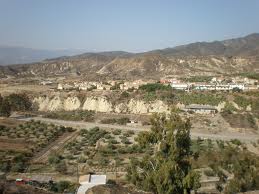 At the bidding of the Junta de Andalucia, the
proposed new town plan for Partlaoa has been stripped of enhancements designed to incorporate the majority of its illegal
houses.
At the bidding of the Junta de Andalucia, the
proposed new town plan for Partlaoa has been stripped of enhancements designed to incorporate the majority of its illegal
houses.
During a recent meeting between town hall officials and AUAN it was confirmed that the Junta has insisted that large areas included in the proposals by the council are unacceptable.
The area of La Canada is to be completely excluded, and the designation of urban land in Partaloa town, Retamar, Cerro Gordo and Piedra Amarilla must be considerably reduced. All other areas were never considered for inclusion in the proposed plan.
The plan fell foul of two restrictions in the planning laws (POTA and LOUA) which limit the rate at which urban land can be increased and stipulate that new urban spaces must be created next to existing urban nuclii or settlements of long standing.
Provisional approval must now be given to a much reduced plan and a further period of public consultation is required due to the significance of the changes. Approval is unlikely to be given until the end of the year.
End in sight for Cantoria illegal homes saga
but worries continue over demolition orders
Costa Almeria News, Matthew Pritchard - May 6, 2011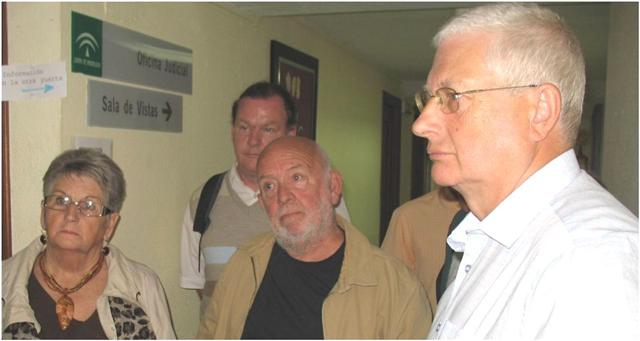
The end is in sight for a group of 13 British homeowners in Cantoria after a case affecting their houses finally came to court.
The 13 groups of Britons all bought villas in a 19-property development in the El Fas neighbourhood.
However, they became embroiled in a legal nightmare in May 2008 when it came to light their houses had been built without the proper permits and were now faced with demolition.
The case was brought by the state prosecutor after the Guardia Civil's environmental department, SEPRONA, denounced Karen Smit, whose former company, Southern Spain Consultants, built the 19 homes, and Julio Piñero, alocal builder who constructed the houses.
Both defendants pleaded guilty to the charge of building unauthorised properties on non-urban land, although Sr Piñero claimed he was not involved in actually promoting the houses and said he was on the verge of bankruptcy due to what had occurred.
The lawyer representing the expats, Alfonso Rubiales, also presented to the court a number of documents arguing against the demolition of the houses.
READ MORE IN THE LATEST EDITION OF COSTA ALMERIA NEWS FROM 6th MAY
Spain's Illegal Homes Overshadow Minister's U.K. Sales Pitch
BLOOMBERG, Sharon Smyth - May 4, 2011
 Jose Blanco, Spain's development minister, tried to persuade U.K. investors today to purchase unsold vacation homes in a country where more than 50,000 home buyers have lost the legal rights to their properties.
Jose Blanco, Spain's development minister, tried to persuade U.K. investors today to purchase unsold vacation homes in a country where more than 50,000 home buyers have lost the legal rights to their properties.
“This is an ideal time to invest in Spanish real estate”, Blanco, 49, told reporters after his presentation. “There has been a significant drop in prices, while all the competitive advantages we offer still exist”, the minister said. He will deliver the same message to investors in France, Germany, Switzerland, the Netherlands and Russia.
The campaign follows renewed calls from European Parliament members including Marta Andreasen, Roger Helmer and Michael Cashman to freeze some of the funds the European Union gives Spain until it resolves legal shortcomings that have stripped once-legal buyers of ownership rights. A non-binding 2009 report by the parliament's petitions committee criticized the country for applying restrictions on coastal property retroactively and showing “judicial laxity” toward corruption and speculation.
“It's inconceivable that anyone would want to invest in property in a country that has shown itself to be lawless when it comes to property rights,” Andreasen, a member of the U.K. Independence Party, said in a telephone interview. “Andalusia has 300,000 illegal homes alone. If we extrapolate that to the rest of Spain, a million homes is a conservative number.”
Andalusian Properties
Andalusia, a popular tourist destination in southern Spain, is one of the worst affected areas, according to the committee's report. A spokesman for Andalusia's regional government, who asked not to be cited by name, said an inventory of illegal properties in the region is being compiled. So far, 25,000 have been identified, he said.
Marisa del Valle, a spokeswoman for the public prosecutor responsible for cases involving town planning and the environment, said there's no way of knowing how many homes have been built illegally in Spain. Eva Santiago, a spokeswoman for the Ministry for Transport and Development, said her department doesn't have an estimate.
About 50,000 owners of beachside properties have lost rights to their homes after Spain's coastal law was amended and applied retroactively, according to PNALC, a group representing owners affected by the coastal law. As many as 500,000 could eventually be affected by the law, the organization said.
Maria Jose Cejas, a spokeswoman for the Ministry for the Environment, said that fewer than 2,000 home owners have lost their property rights under the new coastal law.
British Buyers
British nationals account for about 31 percent of all foreign-owned homes in Spain, the transport and development ministry estimates.
Each of Spain's 8,116 town halls has the authority to make planning decisions and issue building permits with little oversight from the regional or national governments. At the peak of the housing market in 2007, municipal governments collected 40 billion euros ($59 billion) from real estate activities such as building permits and land sales in that year alone, according to Jose Antonio Perez, a professor who teaches about real estate at the Instituto de Practica Empresarial in Malaga.
As property prices more than doubled in the 12 years to 2007, some local officials found unlawful ways of profiting from home construction. There are now 340 cases under investigation of officials and politicians suspected of crimes, according to Jesus Sanchez Lambas, head of the Spanish office of Transparency International, an organization that documents corruption.
In some cases, developers were given permission to build on unclassified land or were allowed to proceed without the appropriate permits, in return for cash or other incentives.
'Isolated Cases'
A spokesman for the Spanish Federation of Municipalities and Provinces, who declined to be named in line with policy, said “isolated cases of irregularities” don't detract from the work carried out by local government officials. The federation has a good governance code that aims to improve transparency and fight corruption, he said.
The national government set up a website in 2009 to enable buyers to see the development plans of more than 900 cities to check whether a property has been built within legally approved areas, Santiago said. It has also increased the number of investigators focusing on real estate corruption and imposed harsher penalties for civil servants who break the law.
Leo Levett-Smith, a 68-year-old retired traffic policeman from Cheshire, England, and his wife were told that the three bedroom retirement home they bought in 2005 in Catral near Alicante for 220,000 euros was illegal three years after the transaction was completed.
'Legal Limbo'
The couple made the purchase through a registered real estate broker, hired a Spanish notary to oversee the deal and got a 130,000-euro mortgage from a Spanish savings bank. They also paid 300 euros for an independent survey on the property. “We left no legal stone unturned and paid property tax to the local government to buy the place,” Levett-Smith said. “Three years later, I was told it had been built without a sufficient permit. I've spent three years living in a legal limbo and the Spanish authorities have done nothing to address the issue.”
Spain built 675,000 homes a year from 1997 to 2006, more than France, Germany and the U.K. combined, according to a report by a unit of Spanish savings bank Cajamar.
Falling Prices
Spanish residential property prices fell in real terms for the first time in more than a decade during the first quarter of 2008 and have dropped by an average of 20 percent since then, the Transport and Development Ministry said in a report today. In large coastal towns, prices have fallen by as much as 40 percent, according to the report, which was distributed in London before Blanco's presentation. The housing boom that ended in 2008 left Spanish banks with 315.8 billion euros in loans related to real estate activities in the fourth quarter of 2010, according to the Bank of Spain. That's after they were forced to take on properties and land in return for canceling debt to bankrupt developers.
Over the past two years, more than 2,600 real estate and construction companies went out of business, according to credit insurer Credito y Caucion, pushing unemployment to 21.3 percent, the euro region's highest.
The country has a surplus of more than 1 million empty homes, both new and existing, according to RR de Acuna & Asociados, a Madrid-based research company. The Development Ministry said in today's report that there are fewer than 700,000 unsold homes in Spain. About 61 percent of those are in Coastal areas, the ministry said.
Building Restrictions
In 1988, the country increased restrictions on coastal development and applied the law retroactively to properties that were already built. Owners of those homes can apply to extend their stay in the property for as much as 60 years, though they can't sell it or pass it on to children. The concession can be rescinded at anytime by the authorities if deemed to be in the public interest.
Cliff Carter, a 62-year-old former engineer from northern England and his Spanish wife, Maria, a retired teacher, say investors should steer clear of Spanish property, after they lost the rights to a 200 square-meter home on the coast of Valencia that has been owned by their family for 40 years.
The Carters sold their home in the U.K. in 2003 to retire to Spain assuming they had equity in the Spanish house, which was built in 1970 and handed down by Maria's late mother in 1998. In 2008, they were informed that it had been awarded to the public domain after amended coastal law shifted the boundaries of where development was banned.
Rights Lost
“We've been awarded a concession to live here for 30 years and then they throw us out,” Carter said in an interview. “I can't sell the property and my children can't inherit it.”
Diana Wallis, vice president of the European Parliament, said that no member state should be allowed to apply laws affecting property rights retroactively or arbitrarily. “I'd like to ask Mr. Blanco how he thinks that anyone can buy property in Spain and have peace of mind,” Wallis said. “On the basis of what I have seen, it's a minefield and frankly I would say 'do not touch'.”
AUAN in EU Petitions Committee 14th April 2011
AUAN , 17th April 2011
Statements of AUAN President Maura Hillen and Helen Prior
Statements of MEP Marta Andreasen of UKIP and MEP Sra Muñiz de Urquiza of the PSOE
WHY IS THIS AN ISSUE FOR THE EU?
Text of AUANs statement with legal notes
MEPs denounce the painful refrain of urban abuses in Spain
AUAN Press release, 11th April 2011
 A petition about
urban planning abuse in Spain submitted to the EU Petitions Committee by the AUAN is to be heard on Thursday, the
14th of April in Brussels .
A petition about
urban planning abuse in Spain submitted to the EU Petitions Committee by the AUAN is to be heard on Thursday, the
14th of April in Brussels .
AUAN President, Maura Hillen has been invited to speak to the committee to put forward the case of innocent homeowners who, having bought their property in good faith, are now faced with the loss of their home without hope of compensation or who live without electricity and water or who face having to pay their developers debts. “These abuses contravene to the EU Treaty and the EU Charter of Fundamental Rights and these laws must be respected and complied with by Spain”, argues Mrs Hillen.
Labour MEP Michael Cashman has been a long-time supporter of victims of Spanish property laws and will be welcoming the petitioners at the European Parliament. “I have literally received thousands of letters and emails from people, across Europe, who are affected by the many property-related problems in differing parts of Spain . This week we will once again shed the light on these scandals and support the courageous victims who have brilliantly organised themselves against never-ending abuses”, said the West Midlands MEP.
Helen Prior, whose home was demolished in 2008 by the regional government of Andalucia, will also address the committee in support of this petition. Helen and Len Prior currently live in their converted garage whilst fighting for compensation through the courts. As it is the case for thousands of others, the Spanish court system has not produced any results for the petitioners.
“We, in the European Parliament, from all the different parties, have been calling for years for solutions to these scandalous problems ranging from a moratorium on new urbanisations and demolitions to infringement cases from the European Commission. However, nothing can be done without the cooperation of the Spanish national and regional governments. It is high time for the victims to be compensated and we will keep up the pressure until they are”, said the Labour Spokesperson for the Petitions Committee.
NOTES FOR EDITORS The committee proceedings will be broadcasted live by webstream on the following link at approximately 10.30. http://www.europarl.europa.eu/activities/committees/homeCom.do?language=EN&body=PETI
Michael Cashman MEP will chair a press conference in SALLE ANNA POLITKOVSKAYA - BRUSSELS - PHS 0A50 at 12.30.
Brits lodge Criminal complaint for discrimination against member of Andalucian Government
AUAN Press release, 1st April 2011
Twelve British
members of AUAN (Abusos Urbanisticos Almanzora No) have lodged a criminal complaint against Josefina Cruz,
Consejera for Public Works and Housing of the regional government of Andalucia for offensive statements made in
Parliament earlier this month. The Consejera is being sued for an alleged crime against the Spanish Constitution,
specifically under Article 510.2 of the Criminal Code because of what the plaintiffs believe are discriminatory
insults relating to statements made by the Consejera in a commission hearing of the Andalucian Parliament on the
9th of March 2011.
According to the Diary of Sessions of the Andalucian Parliament, the Consejera, in response to questions about the illegal houses in the region, is alleged to have stated, amongst other things “I do not know if your are defending the intrusion of people, do not know if your are defending the interests of a group of people who are not of this country, who have settled here illegally, do not know if you are defending these interests, ladies and gentlemen. I do not understand, I really do not understand”.
“I believe that I have said on this occasion that we have also had meetings about this with the British Ambassador, but I am interested in, I am concerned with the general situation, and I am not interested in the particular situation of a group of people who have settled illegally in our territory. I do not understand…, then, your confusion… I do not know if you are defending legality or not defending legality. Ladies and gentlemen, I do not know what you are defending , I do not know where you are coming from.” “We are dealing with a problem which has resulted in Andalucian as a consequence of a lack of respect for the culture of the territory, and the culture of the land and the culture of planning and therefore, it is necessary to adapt, we must give a response within the law, within urban planning, within territorial planning, and with respect for all the legislation relating to protected land, forested land, land protected by rights of way, coasts, etc, etc, etc (…)
Tomorrow I have scheduled a meeting in Almanzora, ladies and gentlemen. Tomorrow I have scheduled a meeting with the Mayors. Ladies and gentlemen, I will meet with the mayors, who are responsible for planning in their municipalities, and from them, one can give information to affected residents, whether they are in an organisation or not in an organisation, whether they bought in good faith, or not in good faith, and who are now demanding that we resolve a problem that they are responsible for creating”.
AUAN alleges that these comments, which were later endorsed before the press, are not acceptable in a democratic state that is also a member of the European Union. They are also gravely offensive to many “people from another country”, to use the Consejeras words, who invested all of their life savings in a house in Spain, having being assured that they had all legal permits, only to find that they risk losing their home.
According to Maura Hillen, president of AUAN, “the members of our association who have made this complaint are victims of the chaotic planning system in Andalucia, which has clearly failed and continues to fail. They were assured that everything was alright when they bought their homes and now find themselves immersed in legal proceedings that could result in the demolition of their house.
In some cases it is actually the regional government who has challenged the building license granted by the town hall. In other cases the town hall or the promoter is subject to a criminal investigation. In none of these cases is the homeowner considered to be at fault. Because of this, and because of the situation in which thousands of people find themselves, the plaintiffs cannot let the remarks of the Consejera pass because they are offensive and discriminatory and give completely the wrong impression.”
Hillen added “These comments were not issued by just anybody, but by a member of the regional government of Andalucia. In fact, the person charged with resolving the urban planning mess in that region. The comments are incorrect and completely misguided. If we do not take action we run the risk of inciting others to take the same view as the Consejera”. She concluded, “This is playing with too many peoples lives. We have to draw a line somewhere. If I was the Consejera, I would resign”.
The case is being brought by Bernardo del Rosal Blasco, a well know criminal lawyer and a former Ombudsman in Valencia.
AUAN PETITION TO BE HEARD IN BRUSSELS
AUAN Press release, 28th March 2011
 A petition about urban
planning abuse submitted to the EU Petitions Committee by the AUAN is to be heard on the 14th of April in
Brussels.
A petition about urban
planning abuse submitted to the EU Petitions Committee by the AUAN is to be heard on the 14th of April in
Brussels.
The petition calls for a European Parliament investigation into abuses in the Almanzora Valley as a matter of urgency.
AUAN President, Maura Hillen, has been invited to speak to the committee to put forward the case of innocent homeowners who, having bought their property in good faith, are now faced with the threat of demolition. Many others cannot get access to electricity and water.
This, argues Ms. Hillen, contravenes the EU Charter of Fundamental Rights and these laws must be respected and complied with by Spain.
ARBOLEAS: PUBLIC MEETING 22nd MARCH 2011 - A SUMMARY
A public meeting took place in Arboleas on March 22nd at the request of the Mayor, Angel Garcia, to enable a public debate on recent feedback from the Inspection of houses on non urban land the planned decree of the Junta de Andalucia. AUAN representatives participated in a panel discussion before the mayor took questions from the floor.
The mayor also address the recent statements of Josefina Cruz.
A summary of this meeting has been prepared for those who were unable to attend.
SUMMARY OF PUBLIC MEETING 22nd MARCH 2011
CANTORIA: 13 HOUSES ON LAND NOT ZONED FOR BUILDING
17.03.11 - - EUROPA PRESS | ALMERÍA
 The
Prosecutor is asking for two and a half years in prison and a fine of 34,500 euros for the brother of the mayor
of Cantoria (Almería), Pedro Maria Llamas (PP), who is accused of promoting the construction, without a
municipal licence, of eight single family dwellings on land not zoned for building and another five on especially
protected land.
The
Prosecutor is asking for two and a half years in prison and a fine of 34,500 euros for the brother of the mayor
of Cantoria (Almería), Pedro Maria Llamas (PP), who is accused of promoting the construction, without a
municipal licence, of eight single family dwellings on land not zoned for building and another five on especially
protected land.
According to judicial sources, the Public Ministry charged Jose Maria Llamas for the alleged commission of a planning crime as described in article 319.1 of the penal code which also requires that he be suspended for two years from working or holding any office or profession relation to construction and to compensate the owners of the homes, for which the prosecutor is requesting demolition.
The development of family homes, located in the settlement of "La Hojilla" in Cantoria, were the subject of a denuncia by the Environmental Protection Division of the Guardia Civil (SEPRONA) in March 2006 although the houses had been occupied two years before by the families that had bought them, in their majority British residents, for an average price of 200,000 euros.
The majority of the houses are located on land classified as 'no urbanizable' although five of them occupy especially protected land, being situated on the channel of a rambla and, therefore, on the public domain of a waterway.
The non delivery of a report from the Andalucian Water Agency (AAA) caused the prosecutor to suspend the hearing which took place this Thursday in penal court number 1 in Almeria until May.
Three of the families who own the houses in litigation are participating in the case as injured parties, with their legal representatives seeking to avoid the likely demolition of these residential homes waiting for the confirmation of the Junta de Andalucias decree to "normalise" the situation of 12,697 illegal homes found in the Comarca of Almanzora.
THE STATEMENTS OF THE CONSEJERA CAUSE DEEP UNEASE
AUAN: Press Release 14th March 2011
 On the 9th of March in a session of the Commission of Public Works and Housing of the Andalucian Parliament,
Josefina Cruz Villalón, Consejera of Public Works and Housing of the Junta de Andalucia, responding to
a question posed by Alicia Martinez Martin, planning spokesperson for the Partido Popular, stated (as recorded
in the Diary of Sessions), amongst other things, the following (the highlighting is ours):
On the 9th of March in a session of the Commission of Public Works and Housing of the Andalucian Parliament,
Josefina Cruz Villalón, Consejera of Public Works and Housing of the Junta de Andalucia, responding to
a question posed by Alicia Martinez Martin, planning spokesperson for the Partido Popular, stated (as recorded
in the Diary of Sessions), amongst other things, the following (the highlighting is ours):
Page 20: "Ladies and gentleman, the confusion is yours. I believe that you do not know what you are defending. I do not know if you're defending the intrusion of people and I do not know if you're defending the interests of a group of people who are not of this country and who have settled here illegally; I do not know if you're defending those interests, Ladies and Gentlemen. I do not understand, I really do not understand.
I have said on this occasion we have had meetings on the matter also with the British Ambassador, but I'm interested, I am concerned about the overall situation, and I'm not worried about the particular situation of a group of people who have settled illegally in our territory. I do not understand ... hence the confusion.... I do not know if you're defending the legality of this or what. I do not know what you are defending, I do not know from what or whom you are coming from.
We are trying to address a problem that has occurred in Andalucia as a consequence of a lack of respect for the culture of the territory, for the culture of the landscape and for the planning culture, and , therefore, one has to adapt, we must respond within the law, within urban planning, within the territorial plan, and in compliance with all the appropriate legislation for protected land, forested land, legislation relating to livestock trails, coasts, etc,etc,etc.
...
Tomorrow, I have scheduled a meeting in Almanzora, Ladies and gentlemen. Tomorrow I have arranged a meeting with the mayors. Ladies and gentlemen, I will meet with the mayors, who are those responsible for planning in their municipalities, and, from there will come information for those residents who are affected, whether they are in an organisation or not in an organisation, whether they are residents who settled in good faith or not in good faith, and who are now demanding of us to solve a problem that some of them have been responsible for creating".
These statements have caused deep offence amongst the victims of urban and real estate abuse in the Valley of Almanzora.
Maura Hillen, president of AUAN said "That's all we need; to attack the people who have been mistreated by the planning and real estate system; who are victims. On top of being insulted, we are vilified. The homes of 200 of our members are in the courts. The prosecutor is asking for demolition. The homeowners are not charged with a crime. It is their town halls, their promoters, their technicians etc.. I challenge Senora Cruz, to make these statements in front of Mr and Mrs Prior and many others who run the risk of suffering the same fate. These comments are unacceptable to our members and we cannot let them pass.
Apart from the political repercussions of such statements, we are studying the legal repercussions of statements which we consider to be insulting. In fact we consider these statements to be shameful."
It's official. There are 12,697 illegal properties in the Almanzora Valley
Auan Press Release, 11th March 2011
- 920 properties earmarked for demolition.
- The remainder likely to foot the bill for legalisation
The Minister for Housing and Planning, Josefina Cruz, met with the Mayors of ten municipalities in the Valley of Almanzora in Almería on Thursday to deliver the results of the Inspection of houses constructed on land not zoned for building in Albánchez, Albox, Arboleas, Cantoria, Fines, Líjar, Lubrín, Oria, Partaloa and Zurgena.
The Minister revealed that 12,697 'irregular' constructions had been identified in the Almanzora Valley alone. Of those some 7.2% or 920 buildings have been found on specially protected land or are less than 4 years old or are incomplete. In these three cases the offence is not proscribed by law and the ministry has instructed the councils to 'restore order' as a priority.
As for the remaining 11,777 houses Sra. Cruz went on to state that her ministry was working on a special 'decreto' or decree to define a uniform set of procedures which would allow these houses to be granted an occupation license and obtain access to services in a manner described as 'self-sufficient' making it clear that public funds will not be used to resolve the situation.
Speaking about illegal houses in Almería in a hearing of the planning commission of the Andalucian Parliament on Wednesday, the Minister is reported to have said "people from other countries had set up home in an illegal way" and now "residents want us to solve a problem that some of them have created".
"12,697 illegal buildings in the Almanzora Valley and nobody noticed?" said Maura Hillen, president of Abusos Urbanisticos Almanzora NO (AUAN), a homeowners association composed mainly of British residents. "Did these houses pop up like mushrooms overnight? Where was the Junta when the houses were being built?" "And how many people will be made homeless and/or lose their life savings if 920 houses are demolished to 'restore order'?" she continued "A conservative calculation would put the financial losses in the order of 90 million euros. Who's going to compensate those who bought in good faith? The Junta? The town halls?"
Commenting on the Ministers announcement of a promised decree Mrs Hillen said "Without seeing the text of this decree, which of course will not be available until after the local elections, it is impossible to say anything meaningful. However, the government has had seven years to deal with this issue and now suddenly two months before an election there is a new decree? The timing is a bit fishy in our view and smacks of electioneering."
"And what about all the civil and criminal proceedings that are currently in progress and could also result in demolition? How is the decree going to save these houses? As usual there are more questions than answers and more smoke and mirrors that any real change in the Juntas position" she said.
Speaking of the remarks attributed to the Minister by the Spanish press the AUAN president said "If the remarks are accurate, blaming foreign homeowners for the woes of the Andalucian planning system is quite insulting and clearly untrue. Comments such as these, if accurately reported, demonstrate a fundamental lack of understanding of the realities of the scale of the planning disaster in Andalucia and are hardly designed to encourage much needed British investment in the Andalucian property market".
"In our view the Ministry of Housing and Planning is like the orchestra on the decks of the Titanic. Fiddling away whilst the ship sinks taking homeowners and what is left of the reputation of the Andalucian property industry with it. Its all a bit of a shambles" she concluded.
HEATED MEETING ON THE ARBOLEAS TOWN PLAN
Auan Press Release, 8th March 2011
Some
three hundred British residents attended a marathon public meeting last Thursday in Arboleas where Mayor Angel
Garcia informed them that 95% of the irregular homes in the municipality should eventually be legalised under
the Town Plan.
However, all that glitters is not gold, and in AUANs view the process could take several years to complete and the titleholder of the land is at risk of having to fund the necessary works to complete infrastructure.
AUAN thanked Sr. Garcia for the opportunity to participate in a round table discussion, which they consider to be a good exercise in transparency, and being brave enough to face a barrage of questions in a meeting which took some three hours.
Sr Garcia outlined the approval process for amendments to the town plan as set out by the Junta and stated that this is the only way to solve the problem within the law as it stands at the moment. According to Sr. Garcia, the approvals process began in July 2009 and is now nearing completion.
He presented documentation to AUAN outlining the next steps, which would eventually include the preparation of an urbanisation project followed by the execution of any works required. According to AUAN president, Maura Hillen, who participated in the panel questioning the mayor, the planning documents indicate that the whole process could take some years, although some areas were more advanced than others.
When asked regarding the power the Town Hall has to extract money from developers, who had a moral obligation to provide infrastructure and who in many cases had been paid to do so, Mayor Garcia said his powers were limited to getting payment from the actual landowner. In many cases this is now the homeowner, not the developer, though some homeowners may be able to claim against the developer, or it is possible that the developer might have a written agreement with the homeowner to complete the infrastructure.
During the meeting AUAN representatives confirmed that the process of legalisation dictated by the Junta is one of the main avenues open to municipalities to sort out the planning chaos and that Town Halls have no power to require constructors to pay for infrastructure if they no longer own the land.
"You are victims of a Spanish planning mess" said AUANs Legal Advisor Gerardo Vazquez. "There are some 300,000 illegal houses in Andalucia alone. The problem is massive. My advice is to join together and demand a change to the law, as AUAN is doing".
ARBOLEAS: PUBLIC MEETING 3rd MARCH 2011 - A SUMMARY
A public meeting took place in Arboleas on March 3rd at the request of the Mayor, Angel Garcia, to enable a public debate on the status of the Arboleas Town Plan. AUAN representatives participated in a panel discussion before the mayor took questions from the floor.
A summary of this meeting has been prepared for those who were unable to attend.
SUMMARY OF PUBLIC MEETING 3rd MARCH
During the meeting the Mayor presented AUAN with a document outlining the steps that will follow definitive approval of the innovations to the Arboleas town plan:
(CLICK TO ENLARGE IMAGE)
INFORMATIVE MEETING REGARDING PLANNING ISSUES IN ARBOLEAS
 Over the past few
months, the Mayor has been having information meetings with parties interested in the houses currently outside
urban planning (AUAN, lawyers, the British press, etc.), as indeed in relation to other matters such as
municipal services and the process of legalization of these dwellings and having them inscribed in the
Catastro.
Over the past few
months, the Mayor has been having information meetings with parties interested in the houses currently outside
urban planning (AUAN, lawyers, the British press, etc.), as indeed in relation to other matters such as
municipal services and the process of legalization of these dwellings and having them inscribed in the
Catastro.
After several such meeting, it has been considered expedient to extend the same to the entire population and to all the media, creating a public working table, including the participation of AUAN, at which full and complete information relating to the status of the planning, future planning and state of the municipal services, so that all can be informed as to the existing documentation, and there is complete transparency, disclosure and access to the information for all inhabitants.
After the information has been diffused, the public will have the opportunity of asking questions.
The meeting is being called for next THURSDAY 3RD MARCH @ 11 A.M., IN THE MEETING ROOM OF THE MUSEO PEDRO GILABERT.
The Mayor invites to this public meeting everyone interested in attending and receiving information as to planning issues in Arboleas.
The invitation has also been extended to associations and professional persons involved in defending the interests of citizens, and the media: the press (La Comarca, La Voz de Almería, Costa Almería News, Arboleas News and other English-language newspapers), the radio (Valle Radio being the only English-language station), and digital means (Arboleas Forum and the Town Hall website).
With the intention of getting this information to the largest number of people possible, the invitation is hereby extended and we shall be grateful if you will advise anyone who may be interested in attending.
Signed:
Angel Garcia
Mayor
Zurgena: First criminal case against the mayor suspended
AUAN, 26th February 2011
As reported in La Voz de Almeria, the first of 12 criminal trials against the mayor of Zurgena , Candido Trabalon and members of the previous town council, planned for the second week in March has been suspended due to a procedural issue.
The judge made the order to allow the town council (as an entity) and the insurance company to put in their defence because they are possibly responsible to pay damages. The case goes back one step but continues.
The article reports that some 30 people, mainly British citizens, are taking part in the case, having allegedly invested in houses outside of planning with an illegal building licence.
The case relates to the construction of 53 houses in the areas know as 'Barranco de Los Pinos' and 'Cortijo Zurano'. The mayor is accused of authorizing, through the concession of building licences and plenary agreements, the construction of houses on land not zoned for building knowing that this was illegal.
Zurgena council to approve its town plan in March
But will the regional government accept it?
AUAN Press release – 21th February 2011 ,
Contact info@almanzora-au.org or call 638323706
Around 100 British
residents were invited to the old railway station in La Alfoquia last Wednesday for a meeting with the Mayor of
Zurgena, Candido Trabalon to receive an update on the status of their homes.
Flanked by his legal team and British councillor Jim Simpson, Sr. Trabalon explained that Zurgena had been negotiating for years with the regional government regarding the number of houses that could be included on the town plan. The mayor declared “We won’t negotiate anymore” and announced that Zurgena council would grant provisional approval to its entire town plan in March with the intention of submitting it to the regional government. He stated that if the regional government did not respond within 3 months the plan would be approved by “administrative silence”.
As the meeting progressed it became clear that none of the court proceedings involving homes constructed in Zurgena since 2004 had been fully resolved. For Candido Trabalon “all licenses granted by the town council are legal”. This view, he declared, was supported in a report written by a legal expert and professor at the University of Malaga.
The mayor estimated the number of houses affected by the court cases to be around 400. A view not shared by AUAN who agree with the judges’ estimate of around 1,000 houses.
The meeting concluded with the mayor calling for the residents to be calm and not waste money on lawyers, stating that the town hall was paying for the defence of all the homes in the courts; that all houses were legal, would not be demolished and should any infrastructure be required, the town hall would pay for it.
AUAN representatives remain sceptical. “The Junta has the legal authority to give full and final approval to a town plan. It is unlikely that they will do so in these circumstances. The cynical amongst us will simply see this move as electioneering”.
The mayor of Zurgena has accumulated a total of 12 open criminal proceedings, including those deriving from the operation known as Costurero which ended in 2007 with his arrest. Sr Trabalon will face trial in the first of these proceedings next month together with the town planner, various councillors and members of the business community. This first case relates to the construction of 53 houses in the areas know as 'Barranco de Los Pinos' and 'Cortijo Zurano'. The mayor is accused of authorizing, through the concession of building licenses and plenary agreements, the construction of houses on land not zoned for building knowing that this was illegal.
A judge investigates more than 100 illegal houses in Partaloa
Court Number 2 in Huercal-Overa has opened 8 criminal proceedings involving council members, a promoter and a town planner
Manual Leon, La Voz de Almeria 10th February 2011 (Translation)
 The judge in
court number 2 of Huercal-Overa has opened various proceedings for alleged planning crimes and prevarication in
the town of Partaloa, with preliminary investigations exceeding five volumes of text.
The judge in
court number 2 of Huercal-Overa has opened various proceedings for alleged planning crimes and prevarication in
the town of Partaloa, with preliminary investigations exceeding five volumes of text.
Seven people have already been declared as defendants, amongst those councillors for the PSOE and the PP and also urban planners and a promoter. Standing accused are the socialist councillors Federico Molina Mora and Antonio Penuela Gonzalez , the PP councillor Jose Gonzalez, the promoter Amador Mora Montalvo and the town planner, Emilio Jose Garcia Rodriquez.
The Prosecutor and the judge are investigating activities relating to period from 2003 to 2007 when the town hall of Partaloa was governed by the socialist Federico Molina. According to the investigation by the prosecutor, which came about because of denuncias by the current town hall administration presided over by Alejandro Lopez (GIAL) and the Environmental Protection Division of the Guardia Civil (SEPRONA), more than 100 houses have been constructed on non urban land, some without licenses.
Amongst those are some 70 houses on an urbanisation in the area of Retamar, 10 in Residencial Los Olivos (Cuesta de los Justos), 13 more on a promotion belonging to Lakes Vegas in the area of Piedra Amarilla, denounced by Seprona and various other single family dwellings in various locations such as Canada Honda and Los Camarotes, including a house constructed on rustic land without a licence belonging to the PP leader, who was fired as councillor for planning by the mayor Alejandro Lopez, a few months ago.
In total 8 proceedings have been opened, (two instigated by the town council and 8 by Seprona), by the judge in Huercal-Overa for alleged planning crimes and prevarication in Partaloa, a village of about 500 residents in the Valley of Almanzora inhabited by a significant number of British residents.
The judge is now awaiting the indictment from the prosecutor to assign a date for trail in one of the criminal courts in Almeria. One of the statements of the town hall lawyer included in the files reveals that Antonio Penuela is a person who since 2004 has directed all of the urban design and construction on rustic land in Partaloa, as partner and participant in the businesses of the promoter Amador Mora, who for his part is the cousin of the then mayor. Penuela had denied these accusations to La Voz.
The Prosecutor asks for a prison term for the ex mayor, a promoter and an architect in Partaloa
The irregular houses under investigation by the judge are mainly occupied by British residents and number over 100
Manual Leon, La Voz de Almeria 11th February 2011 (Translation)
The ex mayor of Partloa and current opposition councillor for the PSOE Federico Molina Mora, together with the
urban planner, Emilio Garcia Rodriquez, and the promoter Francisco Javier Fernandez del Pino are facing a demand
for 6 months in prison and disqualification for planning crimes and prevarication.
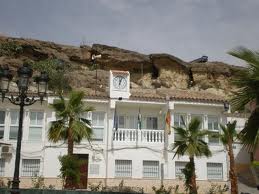
The request was made by the Prosecutor in the written accusation presented in Court Number 2 in Heurcal-Overa and awaiting trial in one of the criminal courts in Almeria.
Proceeding 31/09 seeks to clarify the alleged urban irregularities committed in the area of Piedra Amarilla in Partaloa with the construction of ten houses on non urban land. The promoter Lakes Vega, with headquarters in Arboleas, obtained municipal building licences, despite being on rustic land.
The houses are inhabited in some cases by British residents and the construction was denounced by agents of Seprona from the Guardia Civil.
This is the most advanced of the eight cases opened at the request of the current council and agents of Seprona and under investigation in court number 2 in Huercal-Overa against council members, promoters and planners for alleged construction on non urban land in the municipality, numbering over 100 houses in the areas of Retamar, Los Justos, Piedra Amarilla, Canada Honda and Catamaranes.
To this we must add four administrative cases brought by the Ministry of Housing and Planning against the town council of Partaloa for planning irregularities in the neighbourhood of Retamar, in Poligono 10 and for segregation against Jorefe mercantile in the neighbourhood of Piedra Amarilla.
There are older proceedings which, according to the municipal legal advisor, have been proscribed, which involved councillors Jose Gonzalez Reche and Bartolome Moreno Garcia. Other cases, opened at the request of the Prosecutor, also involving people from the town hall, turn the spotlight on the urbanisation of San Jose in Piedra Amarilla and the criminal proceedings against Jose Reche Fernandez, Federico Molina, Meliton Moreno, Enrique Moreno and Emilio Jose Garcia.
In this municipality of some 1,000 inhabitants a notable colony of British residents has flourished en the last few years as a result of the fever of construction in the Comarca de Almanzora in some cases on non urbanizable land.
A missing bank guarantee
The current mayor, Alejandro Lopez (GIAL), stated yesterday to Cadena Ser that "we have detected a series of very serious irregularities from the previous administration, which we have made known to the Prosecutor and the Judge who have seen evidence of a crime". Lopez considers that "we do not want houses that were constructed on non urban land to be demolished because they are occupied and the owners are not at fault; what we want is for them to be regularised and included in the current PGOU, but in compliance with the planning obligations as required by the law".
The mayor also denounced the disappearance of a bank guarantee for 65,000 euros which was deposited in the Council on behalf of the promoter Amador Mora Montalvo.
Cousins and Friends from childhood
A document submitted to the Prosecutor by the town council describes Antonio Penuela Gonzalez, councilmember in Partaloa and PSOE candidate for the upcoming elections in May, as the brains behind the illegal construction plot in Partaloa. "From 2004 he has directed all of the urban design and construction realised on rustic land, acting as partner and participant in the businesses of the promoter Amador Mora Montalvo, who for his part is the cousin of the then mayor and socialist councillor Federico Molina Mora". The legal advisor provides a notarised document in which Mora gives power of attorney to Penuela in all of his businesses. In his declaration before the judge in Huercal-Overa, Penuela denied the allegations, although acknowledging that Amador Mora is a client of his consultancy in Olula and that they are also friends since childhood.
Arboleas - Keep politics out of planning
AUAN Press release – 25th January 2011 ,
Contact info@almanzora-au.org or call 638323706
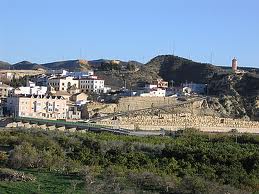 Somewhere between the optimism
of the latest press release from the current socialist mayor of Arboleas, Angel Garcia, relating to progress towards
the legalisation of some 270 constructions in his municipality and the pessimism of his main socialist rival, Cristobal
Garcia Granados, lies reality based on the facts.
Somewhere between the optimism
of the latest press release from the current socialist mayor of Arboleas, Angel Garcia, relating to progress towards
the legalisation of some 270 constructions in his municipality and the pessimism of his main socialist rival, Cristobal
Garcia Granados, lies reality based on the facts.
AUAN is a politically independent homeowners association. We have funded independent research and analysis of the planning situation in many towns of the Almanzora Valley, including Arboleas.
In August 2009 we lodged objections against all of the amendments to the Arboleas town plan because we felt that we had not been given adequate access to the full text of the planning documents during the public review period to assess costs, responsibilities and timelines on behalf of our members. Arboleas town hall responded to our objection, relations have improved and we now have copies of all the documents that we required.
AUAN is therefore in a position to comment on the plans based on a review of the planning documents rather than the words of our politicians:
- In June 2009 the regional government permitted Arboleas to adapt existing planning documents from 2001 to create a baseline town plan.
- In August 2009, the council published 11 separate enhancements to that plan to incorporate all the development that has taken place in Arboleas since 2001.
- We can confirm that plans number 02 (Los Torres I, El Rincon, Los Menchones and the town centre) and 04 (Los Llanos I) have passed all the major stages of approval and are awaiting Final approval in Almeria.
- We can confirm that plans number 05 (Los Requenos), 06 (Zona Industrial), 07 (Los Carrascos), 08 (Los Higuerales), 09 (Los Llanos II, Los Gilabertes, Los Colorados), 10 (El Rulador, Los Menchones II) and 11 (Los Garcias) have been given a favourable report by the Obras Publicas y Vivienda. HOWEVER, we are very mindful of the fact that these plans still need to be approved by the Environment Ministry who will determine if the houses have been constructed in a dangerous location or on protected land.
- We understand that plan 03( Los Torres, La Perla, El Prado, Limaria) has received a favourable report from all departments of the regional government and has reached the penultimate stage of approval. We anticipate that this plan will move to its final stage in the coming months.
- Furthermore, based on the information contained within the text of the project plans (the Memoria), AUAN can confirm that the town planner estimates that it will take a maximum of 5 years to organise, fund and execute each plan from the point of its final approval in Almeria.
- AUAN can confirm that the plans stipulate that the LANDOWNER is required to provide the costs of missing infrastructure and that those costs vary according to circumstances. For example, the amount of infrastructure already in place.
- The provision of an integrated sewerage system for Arboleas is the subject of an additional plan which is now been finalised for submission to the Regional Government together with an application for funding. The project plan anticipates that funding will be forthcoming from the regional government and the EU.
What is NOT clear from the project plans is who currently owns the land, or what happens if the landowner is unwilling or unable to provide the necessary funding.
It is also not clear as to WHEN the town hall can legally issue a license of first occupation to the homeowner, thus resolving ongoing issues regarding access to services.
AUAN is currently engaged in constructive discussions with the mayor of Arboleas (Angel Garcia) and other mayors about the best way to increase transparency and the flow of information to the homeowners.
Illegal Houses - Court overrules the Junta
AUAN Press release - 24th January 2011 ,
Contact info@almanzora-au.org or call 638323706
 AUAN is pleased to
learn that a recent judicial decision seems to have improved the situation for the owners of illegal houses. The
Magistrate of Administrative Court No. 3 in Almeria, Judge Jesus Rivera (left), made a ruling on the 21st of January
in which he rejected the Juntas reasons to nullify a licence of first occupation granted by Albox Town council, thus
allowing the homeowners to contract water and electricity.
AUAN is pleased to
learn that a recent judicial decision seems to have improved the situation for the owners of illegal houses. The
Magistrate of Administrative Court No. 3 in Almeria, Judge Jesus Rivera (left), made a ruling on the 21st of January
in which he rejected the Juntas reasons to nullify a licence of first occupation granted by Albox Town council, thus
allowing the homeowners to contract water and electricity.
According to the ruling the house was constructed several years ago on non urban land without a license and any administrative action against it was proscribed. After satisfying several requirements, Albox Town council granted a license of first occupation to this property under a special 'ordenanza' or regulation which was created specifically to deal with this type of housing classified as 'fuera de ordenacion'; that is to say constructed without a license but untouchable by the administration.
The Junta challenged the license of first occupation on the grounds that there was no building permit for the property and that these houses should be regulated by an urban plan. Alfredo Najas de la Cruz, representing Albox Council and Pedro Maldonado Ruiz acting for the homeowners, argued against the Juntas interpretation.
Judge Rivera found that the Juntas argument was erroneous and indicated that the administration "cannot in any way ignore reality" and that it "cannot prevent houses that are fuera de ordenacion from obtaining services which grant them the normal conditions of habitability". Judge Rivera indicated that if the repair and maintenance of such houses is permitted, common sense dictates that they should also have services, especially when the license of occupation was granted under the strict terms of a special regulation that was not challenged by the Junta when it was created.
The President of AUAN Maura Hillen said "With all due respect, we sometimes think that the Junta lives on another planet. We understand that it was actually the Junta itself who established the special regulation to deal with houses that are 'fuera de ordenacion' but then when various town councils had spent money implementing the regulation and granting licenses, they began to challenge them! And all this after people had trusted this regulation and spent lots of money complying with the requirements". She added "Thank goodness that the court has recognised that there should be some common sense. We have tried without success to explain common sense to the Junta. I hope that the mayors of Almanzora will get through to them. Otherwise, the message will be delivered in the polling booths"..
ENOUGH OF ANNIVERSARIES, WE WANT JUSTICE
AUAN Press release – 9th January 2011 ,
Contact info@almanzora-au.org
To mark the third anniversary of the demolition of their home in Vera, Helen and Len Prior sent nearly 400 New Year cards to politicians, members of the Junta de Andalucia, mayors, legislators, judges and even the King of Spain to underline their continued fight for justice.
Recipients in the UK included the Prime Minister, members of parliament and the British Ambassador to Spain. All Spanish and English MEPs also received cards. This action was supported by two organisations fighting urban abuse injustices in Andalucia, AUAN in the Almanzora Valley and AULAN in Levante.
The international scandal of the demolition in Vera has contributed to a European-wide crisis of confidence in the Spanish housing market and the card shows a graph of the sharp descent in house sales to foreign buyers over the last four years which reflects this.
In the case of the Priors, appeals and counter-appeals between Vera council and the Junta de Andalucia continue. In the meantime the barrister for the Priors has requested that the Judge order Vera council to compensate them now, on the understanding that if the final decision goes against the Junta, the council can recover the costs from them. The result of this request is still not known.
Three years of homelessness, financial and emotional distress is a cruel and inhumane treatment of these innocent victims of urban abuse who still wait in limbo for justice.
The text of the card reads : Our New Years wish is a just and intelligent solution for the innocent victims of urban abuse in Andalucia.
Additional Reporting
Junta de Andalucia to clarify legalisation criteria for the tens of thousands of illegal homes in Andalucia through further study
AUAN – 4th January 2011
 According to press
reports the Ministry of Public Works is preparing a new regulation to define a uniform set of regularisation criteria
which will be applied to the tens of thousands of illegal homes in Andalucia.
According to press
reports the Ministry of Public Works is preparing a new regulation to define a uniform set of regularisation criteria
which will be applied to the tens of thousands of illegal homes in Andalucia.
There are no plans to change the existing planning laws (the LOUA) but rather this latest development seeks to perform further studies and clarify how the law should be applied in a uniform manner.
As reported in El Pais.
A decree will determine the criteria to be followed with illegal housing
The Ministry of Public Works is preparing a specific regulation to provide a solution to the tens of thousands of houses constructed on undeveloped land (suelo no urbanizable) in rural areas finding themselves in legal limbo and exposed to a varied, if sometimes contradictory range of administrative and legal responses. More than a regulation which establishes requirements, the text will establish a homogenous set of procedures and requirements to regularise these homes: but it will not involve a change to the law.
The vast majority of these houses will not be included on town plans because they are on land not zoned for development and away from consolidated urban centres. According to the Ministry of Public Works it is seeking to define the minimum requirements with which these houses can obtain a license of first occupation and give the homeowners some judicial security.
The regulation, which presumably will be a 'decreto' or decree, will have three basic assumptions: Houses that can never be legalised or incorporated into any plan will be demolished; those that can meet the minimum requirements will survive, although they will be 'fuera de ordenacion'; and those that can be legalised will be legalised with all the consequences that that entails. The wide variety of reasons for the problems and the widely varying degrees of non compliance must also be considered when establishing the criteria for regularisation, as must the different ways in which the construction phenomenon evolved between regions and territories.
In addition to meeting the planning requirements, one of the essential requirements for regularisation is that there are no repercussions on the public purse, and that the promoters or the homeowners bear the cost for the provision of services and basic infrastructure. This is to protect the interests of other homeowners who purchased a home legally and therefore contribute their rates and taxes to the maintenance of public services.
Houses that will be condemned for demolition are those constructed on especially protected land or those that do not comply with specific regulations, especially environmental regulations or any infringement of the Coastal Law.
For houses that benefit from some type of regularisation, even 'fuera de ordenacion', the regulation will consider a variety of criteria to evaluate the severity of the planning breaches. "It will be a comprehensive piece of legislation" according to sources in the Ministry, because there are a large variety of situations. There are houses in a situation of illegality because they were constructed with certain characteristics before the laws that prohibited these characteristics came into force. The Ley de Ordenacía Urbanística de Andalucía (LOUA) of 2003, prohibits the construction of a house on rural land on a plot of less that 25,000m2 , the use of which is confined to farming, cattle rearing or forestry.
The Ministry maintains that the solution for the tens of thousands of houses on non urban land will be considered on a case by case basis within the ambit of urban planning in each municipality. The mayors of the areas most affected by the proliferation of houses on rural land, especially in the Malaga area of La Axarquía have repeatedly called for the drafting of a new regulation defining the uses of "seulo no urbanizable" : something which the Junta de Andalucia considers unnecessary because the LOUA already defines what is possible and what is not.
PP submits a motion to the Andalucian Parliament proposing measures to speed up the process of legalisation in the Almanzora Valley
AUAN – 3rd January 2011
 Further to AUANs meeting
in November with Javier Arenas, president of the Andalucian Popular Party (PP), the PP submitted a 'proposition no de
lay' or motion to the Andalucian Parliament which was published on the 3rd of January. The motion will be debated in
February.
Further to AUANs meeting
in November with Javier Arenas, president of the Andalucian Popular Party (PP), the PP submitted a 'proposition no de
lay' or motion to the Andalucian Parliament which was published on the 3rd of January. The motion will be debated in
February.
A text of the motion is as follows (Note the similarity between point 1 and latest initiatives announced by the Ministry):
The lack of control in urban planning has generated, in many of the towns and Comarcas of Andalucia, a complex phenomenon where many houses have been constructed outside the margin of the planning regulations.
In Almeria much of the towns of the Comarca de Almanzora y Levante such as Albox, Arboleas, Zurgena, Albanchez, Cantoria, Oria, Partaloa or Macael have this type of housing. There are serious problems in these towns where many homeowners, who have been waiting for years for their homes to be legalised because of a lack of basic infrastructure are demanding basic services such as sewerage, street lights, roads etc..
The responsibility for Control and Inspection of Territorial and Urban planning lies with the town halls and the Junta de Andalucia as defined in the LOUA of 2002, within the ambit if its responsibilities and the framework of administrative collaboration. However, in many cases the town halls have not acted. In some cases because of a lack of resources, in others because they did not want to make unpopular decisions. The fact is that the Junta de Andalucia has also not exercised its functions.
It is not possible to regularise everything but we would like to create a plan which regularises as much as possible, giving basic services and some judicial security to these residents.
For all of these reasons the Partido Popular proposes the following:
Proposicion no de Ley
- Establish standard procedures by which the town councils who are involved in the regularisation of homes via their town plans can have some basic guidelines on how to implement the regulations.
- Establish a temporary programme and criteria to co-ordinate the municipalities.
- Guarantee in the budget for the Junta de Andalucia for 2011, an approved budget allowance for the affected towns of the Comarcas of Levante y Almanzora, to accommodate the necessary infrastructure plans in collaboration with the town halls and the homeowners.









